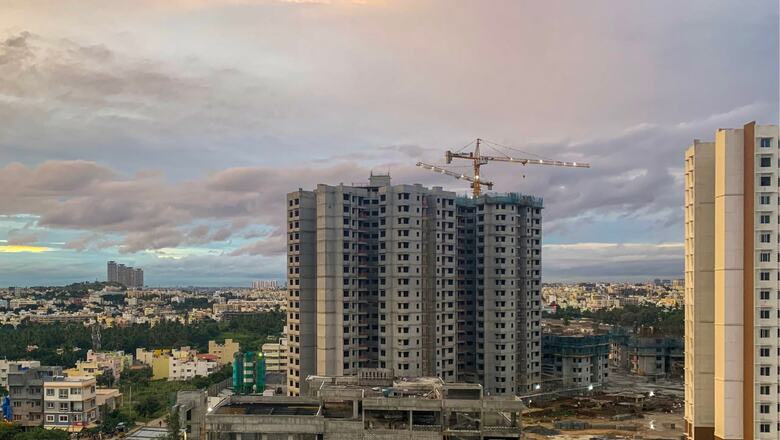
views
The Indian real estate landscape has shown immense growth and resilience over the past few years. Homebuyers, sellers, and industry experts alike are keenly observing the potential shifts in the housing market, with a hopeful eye toward a future where home prices may become more accessible. 2023 witnessed the highest number of new project launches in a decade, with the first three quarters outpacing almost the entire record from the previous year. This paves the way for a positive trajectory in 2024, ensuring the sector is all set for sustained growth and momentum in 2024 and the coming years.
Also Read: Noida, Greater Noida Register Residential Properties Worth Rs 3,179 Crore In Q4 2023; Check Details
What Would Drive the Market in 2024?
Economic Factors- The real estate sector plays a pivotal role in strengthening the country’s economic landscape. The sector’s bull run is set to continue and contribute 11-13% to India’s GDP by 2025 and it is predicted to be worth $1 trillion by 2030. There are various factors responsible for such a transition.
After the pandemic, people have realised the significance of owning a tangible asset. The mandate to return to offices is also steering professionals back to the workplace. Compared to the earlier preference for outskirts, people are now looking for properties within city limits.
Also Read: Rents Rocket Across Indian Cities With 17% YoY Spike, Gurugram Tops With 31% Surge: Report
Cities are undergoing transformative changes as a result of relentless urbanisation. In the face of ongoing global economic uncertainty, the stable and enduring nature of real estate is proving to be a source of reassurance and relief to investors.
NRI Interest- Non-Resident Indians (NRIs) are actively pursuing a tangible connection to their homeland and are looking to buy properties in India. In the fiscal year 2019-2020, NRIs constituted approximately 10% of total investments in the Indian real estate market. Subsequently, this figure has reached around 15% now and is expected to rise to 20% by the end of 2025.
Government policies are encouraging this trend, and Indian builders are also reaching global standards of excellence.
This uprise is fuelled by a convergence of factors, including an increase in rental yield, the sustained depreciation of the Indian rupee, favourable economic policies, an emotional connection with the home country, and the demonstrated fortitude of the Indian real estate sector amidst challenges.
Market Dynamics & Buyer Trends
Upscale Lifestyle Trends- As the Indian economy is expanding, people with higher disposable incomes want a more upscale lifestyle. There is a growing demand for homes adorned with lifestyle amenities such as fitness centres, swimming pools, and lush green landscapes.
Not only High-Net-Worth Individuals (HNIs) and Ultra High Net Worth Individuals (UHNIs), but upper-middle-class individuals are also expanding their budgets to acquire larger living spaces.
The demand for 3BHKs has notably increased over the past year, particularly in light of people with hybrid work modes wanting more spacious residences. Due to the rising demand for more spacious residences, prices in IT corridors are now averaging around Rs 11,000/sqft.
Environmental Considerations- Over the past two years, the Indian real estate sector has witnessed a significant inclination of buyers towards sustainable properties. From energy-efficient designs and eco-friendly construction materials to water conservation initiatives, the realty sector is redefining the living experience.
Home buyers are looking for a living space that resonates with their core values and convictions. New-age homebuyers, especially millennials, are concerned about their environmental responsibility, and prioritise homes with renewable energy sources, rainwater harvesting, and energy-efficient appliances.
Sustainable residences optimise a lot of natural light and ventilation, imparting a sense of spaciousness and openness. Particularly for those who work from home, this curtails stress levels and elevates their mood, fostering heightened productivity.
Despite the upfront expenditure on green real estate being relatively higher than that of a conventional dwelling, people can significantly reduce their utility bills later, making it a prudent and cost-effective choice in the long run.
Housing Preferences- A shortage of Ready-to-Move-In (RTMI) inventory along with the price hike in gated communities is pushing buyers towards under-construction projects, resale properties and individual homes respectively.
Resale properties are in demand as they deliver a decent living space without having to wait a lot or spend too much on the interiors. Meanwhile, under-construction houses are preferred because the price of the house is anticipated to increase significantly upon project completion.
Investment Shifts- Conventionally, commercial properties have been preferred for investment because of their superior returns and minimal maintenance demands. But a notable upswing in the rental yield of residential properties in the last two years, along with their cost-effectiveness, has tipped the scales in their favour. Given the swift escalation in prices, there is a prevailing anticipation that residential properties will outperform their commercial counterparts in terms of capital appreciation.
Changing Tenant Behaviour- This sudden spike in rental costs is also causing a shift in tenant behaviour. With the option of turning their high rent into monthly EMIs, homeownership is emerging as a financially prudent alternative for many. According to NoBroker Annual Real Estate Report 2023, the percentage of first-time property buyers has risen from 62% in 2022 to 68% in 2023, with spiking rentals serving as a significant driver for this shift.
Seller Strategies- A significant number of sellers are also opting to reinvest in new properties. The favourable market conditions, coupled with capital appreciation and appealing rental yields, make it an attractive financial strategy.
Government Initiatives and Policy Rates
India’s commitment to affordable housing stands firm with initiatives like the Pradhan Mantri Awas Yojana (PMAY). With over 50% of India’s household savings invested in real estate, these initiatives are also contributing significantly to the sector’s growth.
The Reserve Bank of India (RBI) maintains a steadfast status quo on policy rates. This acts as a catalyst for high growth in the housing sector. The anticipated continuation of this stability is expected to provide further impetus to the demand for housing.
Technology’s Role in Transition from Offline to Online
Technology has transformed how we perceive, access, and invest in real estate. Accessibility is instant, and market trends are at our fingertips. Proptech advancements, from virtual property tours to instant transactions, redefine conventional house hunting, transcending the limitations of time and distance.
With the added convenience of metro-based search filters on proptech platforms, individuals can now explore homes beyond their immediate office vicinity, unlocking more affordable housing opportunities and yet save time in their daily commute. Online platforms are aiming to become a one-shop-stop for all things related to real estate- packers and movers, rental agreements, maintenance bill payments and other housing-related services etc..
Positive Outlook for 2024
The rental market has already reached its peak, showing no signs of a downturn in the future. This situation presents an advantageous scenario for investors, as these property units are poised to continue yielding good returns.
Moreover, there’s a pronounced resurgence in construction activity post-Covid, channelling renewed momentum in the real estate market. As projects resume and new launches approach completion, the market is poised for a recalibration, ensuring stability in property prices. The confluence of market dynamics, government initiatives, and evolving preferences of homebuyers sets the stage for a thriving real estate landscape in 2024, making it a promising year for homeownership.
-The author is co-founder, chief product & technology officer, NoBroker.com. Views expressed are personal.

















Comments
0 comment